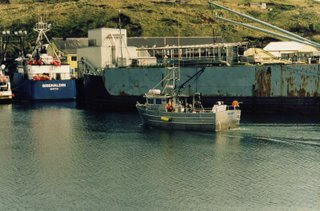Fishermen and scientists collaborating rock

"More than 30 academics from Dalhousie and Saint Mary’s universities stood at the corner of Spring Garden Road and Robie Street in Halifax to protest Canada’s opposition to a proposed United Nations moratorium on dragging.
Last time I was in Dutch Harbor, this 32 footer was about half of the locally owned boats.
Of course, we're talking bottom trawling here. Dragging very large and heavy fishing tackle weighing tons over the ocean floor. And, the U.N. proposal is for the High Seas, the no-mans land beyond 200 miles of every nations' shore line.
Canadian fishermen don't need to worry, at the present, any more than U.S. fishermen do. But this proposal, aimed mostly at the sea-mounts of the world's oceans, sure looks like the anti-dragging movement is getting a leg up. It's always a fight it seems. Industry vs environment and everyone else. But in Boston there is a conference going on that stresses collaboration between scientists and fishermen.
"ICES, the International Council for the Exploration of the Sea, comprising marine scientists from around the world, is hosting a five-day symposium focusing on integrating commercial fishing and ecosystem conservation. Steve Cadrin of the University of Massachusetts at Dartmouth advocates an even more holistic approach to collaborative research. Not only should fishermen operate research platforms — their vessels — they should be involved in all phases of research, from the identification of a research goal to the publication of a study’s results." National Fisherman Magazine
The reason I came back to bottom trawling today is because of a industry lobbyist for the California Wetfish Producers Association. Scientists talk their heads off to try to tell us all that biodiversity on the bottom of the ocean is not some tree-hugging fuzzy logic, but a real issue in the safety of our food supply. Then you got the lobbyists, who could care less about the food supply, but do, about the results they need to make sure that their paycheck keeps coming on time. They may not even like fish. So when a reporter tries to get the other side of the story, to be balanced, the nearest counterpoint person they lay eyes on is usually a lobbyist in these fisheries issues. They are at all the public meetings in force and doing their best to get their narrow, uneducated interests aired.
So, it really tickled me to hear of a collaborative plan that didn't include lobbyists. Just fishermen working with scientists. Sounds too good to be true. Both sides could get a little education and maybe thats whats needed to stop comments like this from the Lobbyist/Chairwoman of the North Pacific Fisheries Management Council to a stakeholder, "Don't you ever get tired of losing?" I don't even think it would matter if the fisherman was a hired skipper for a multi-national fish company, like a lot of bottom trawlers in Alaska are. The main goal is to get the people with all the knowledge of the ocean together: the fishermen and the scientists, and keep everyone else out of it.
A lot of scientists are percieved as the "protectors of nature at all costs," including livelihoods and business activity. Draggers are often percieved as thinking that the bottom is bare as a parking lot, with their target species just hovering there over the ocean floor, waiting their chance to be dinner in Manhattan. One Canadian fisherman described bottom trawling as needing to catch 750,000 pounds of unwanted fish and bottom to get 100,000 pounds of keepers. That's probably not always true. But when you are trying to feed kids at home, that other 750,000 pounds that gets tossed over the side is just slowing you down getting back for a kids soccer game. Just a part of doing business, right?
Something's gotta give. When you throw 3 billion pounds of unwanted fish over the side dead every year in U.S. waters, year after year, it's imaginable that some scientists are right in saying we'll be totally devoid of fish by 2050. It's not only bottom trawling they are worried about, but the insults to the ecosystem of pesticides and fertilizers. And the likes of that gasoline truck that spilled 40,000 gallons of gas in Mill Creek near Salem, OR, or the asphalt truck that dumped it's load of hot oily tar into the Klamath River this summer.
Oregon has a great program of taking school kids to watch salmon spawning in the nearest stream. Not easy to find them, but that's why the program is so important. If the kids see how intact the ecosystem needs to be to raise a fish, they might be inclined to want to see it stay that way for when they are older. If we all thought salmon and flounder grew in Safeway's back room, and lobbyists rock, we'd surely be living on a wasteland by 2050.
Personally, I vote for politicians who tend to listen to their constituents rather than lobbyists. I just hope we "get it" en mass before our ecosystems go over the tipping point. Here's one candidate for Kodiak that doesn't fool around when there's good fisheries legislation needing writing.


<< Home